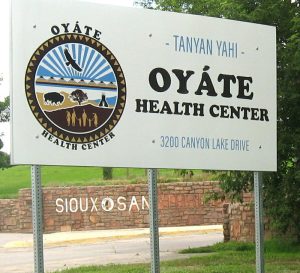Chaos at Sioux San still evident
 RAPID CITY— Despite the Oyate Health Center having already begun their 93-638 contracted health care at the Sioux San location, Rapid City Indian community opposition still exists from more than one group, but the principal remaining group, Native American Indian Community of Rapid City, and the Black Hills Area Council of Representatives (hereafter called the Council), has filed for injunctive relief, on June 28, 2019, to discontinue Oyate Health Center operation.
RAPID CITY— Despite the Oyate Health Center having already begun their 93-638 contracted health care at the Sioux San location, Rapid City Indian community opposition still exists from more than one group, but the principal remaining group, Native American Indian Community of Rapid City, and the Black Hills Area Council of Representatives (hereafter called the Council), has filed for injunctive relief, on June 28, 2019, to discontinue Oyate Health Center operation.
“The contract has caused chaos at the Health Facility and is jeopardizing the health of patients,” the Council said in their press release, dated August 12. Defendants named are Rear Admiral Michael D. Weahkee, Principal Deputy Director of the Indian Health Service (IHS), and James Driving Hawk, IHS Area Director.
A brief history: The Great Plains Tribal Chairman Health Board (hereafter referred to as the Health Board), a health advocacy agency, under the direction of Jerilyn Church, sought three tribal resolutions, to validate their 638 takeover (as allowed in the 1975 Indian Self Determination Act [ISDA]). The Rapid City Indian Hospital, although designated on their website as an “urban” Indian hospital, is not part of the Urban Indian Healthcare network, which has two local facilities, one in Pierre, and the other Sioux Falls. Rationale for this separate designation can be found nowhere, but the consequence is three tribes, the Cheyenne River Sioux Tribe, the Rosebud Sioux Tribe and the Oglala Sioux Tribe, were given jurisdictional responsibility over the hospitals, although they were directly managed by the Indian Health Service (IHS).
All three tribes passed resolutions in support of the Health Board takeover, but Rosebud rescinded their resolution citing several concerns, chief among them that as a health care advocacy agency, the health Board was not qualified to manage a hospital. Not long after, the I.H.S. denied the Health Board’s plans for relocating at a Shepard Hills location, and Church had to proceed with only a two resolution approval, and remain at the Sioux San location.
Rancor has existed between the Health Board and those claiming to represent the majority of the Rapid City Indian community. A 1973 Amendment to the Transfer Act of twenty years previously, subsection B, stipulated that the Secretary must consult directly with the “community served” not the tribe or tribal organizations, distinguishing it from subsection A, which called for the latter. Later, this amendment was amended to stipulate the IHS secretary and not the Health and Human Services secretary. Some in the activist community called for consultation based on this amendment, and some wanted to challenge the Health Board 638 takeover as an 1868 treaty violation. Church survived all court based opposition, and opened the Oyate Health Care Center on the first and third floors of the hospital, while IHS remains on the second floor.
The complaint filed by the Council asserts, “The IHS has given a contract to a local, non-profit corporation created by the IHS called the Great Plains Tribal Chairmen’s Health Board, which is not a tribe or tribal organization. Under Public Law 93-638, only a Tribe or Tribal Organization can participate in a contract.” However, subsequent inquiry by the NSNT has determined third parties can be hired to operate a 638.
The Council also asserts: “RADM Weahkee claims there are two Tribal Resolutions authorizing this contract making it legal. However, as the tribes have no jurisdiction off of the reservations, a group of local Rapid City residents, patients of Sioux San and tribal members, deny the legality of the Tribal Resolutions from the Cheyenne River Sioux Tribe and the Oglala Sioux Tribe.” This is why they have court battles, because that will be determined there.
The Council asserts that the contract violates their treaty rights to health care, but this will be difficult to prove given the contract is likely not in violation of the ISDA 93-638 rules, and IHS services are still available on the second floor.
The Council said that more than 150 signatures “have been gathered from the Rapid City Native American community members who wish to join the law suit.” They also said that federal judge Jeffrey Viken “has been approached with an amendment to change the complaint to a class action.”
Finally, the Council said in the press release, that law professor Pat Lee has offered his Pro Bono services on this case. For those wishing more information from the Council, contact George Jewett at 605-209-5696.
(James Giago Davies is an enrolled member of the Oglala Lakota tribe. He can be reached at skindiesel@msn.com)
